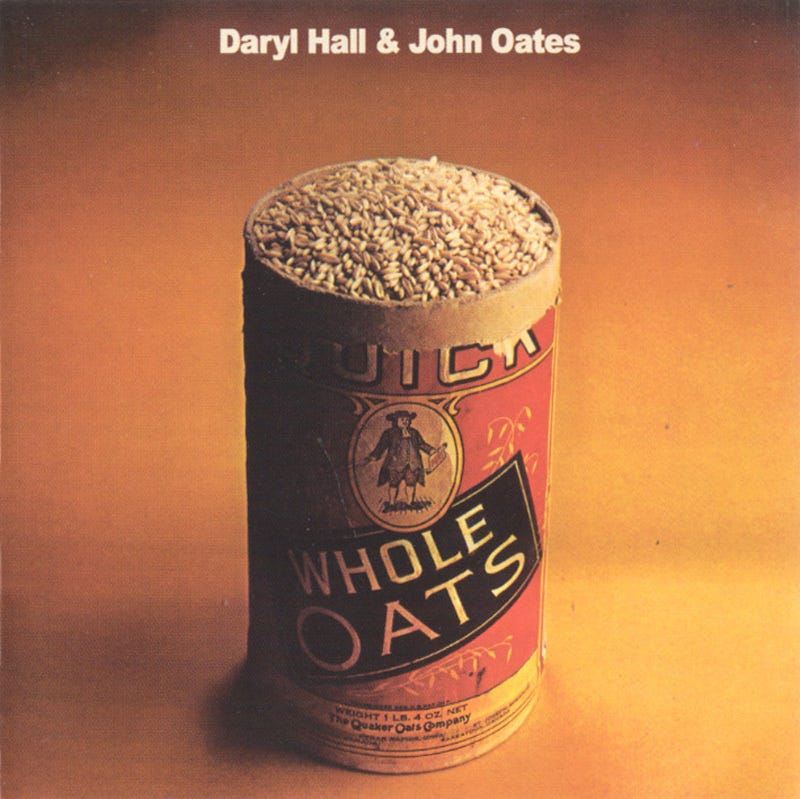Daryl Hall and John Oates released their debut album, Whole Oats, in September 1972 on Atlantic. It opens with "I'm Sorry," a stately, piano-driven harmony pop number with clipped, understated guitar licks. This is one of four Hall–Oates compositions along with "All Our Love," a folksy, acoustic strum-along with twangy licks and wistful harmonies.
Daryl Hall wrote the remainder of side one. "Georgie" starts as a lucid, rhythmless piece comprised of glowing Fender Rhodes electric piano and vocals about an accordion-playing church boy who sneaks off to the nearby lake with the Reverend's daughter, where she "caught her locket on an underwater branch, and the next thing she knew... she died." In light of this revelation, stark chamber strings overtake the song's arrangement.
"Fall In Philadelphia" starts as a bleak piano ballad about hardship, then moves through a funky barroom bridge where Hall declares his need to move to the countryside. The chorus (in Cmaj7) renders the title with Philly-style harmonies and glowing vibes. A sax-laden coda takes the song to a fading standstill. "Waterwheel" is a sparse piano ballad with tender vocals and a brittle two-handed ivory pattern that resolves on the line "spinning round." Midway, Hall yields to a crisp, plucked acoustic solo. "Lazyman," about a non-achiever, has an equally sparse piano arrangement with pauses and orchestral flourishes.
Hall and Oates co-wrote "Goodnight and Goodmorning," a sunny acoustic harmony ballad with light string overlays and a plucked mandolin solo. "They Needed Each Other," another Hall lone-write, concerns a sculptor whose beloved vanishes before he could finish her statue. The song's lucid arrangement — dreamy, glowing Fender Rhodes piano and faint, shimmery strings — presages later subconscious numbers by Hall ("Falling," "Why Was It So Easy'') and artists like Chicago ("(I've Been) Searchin' So Long''), Gary Wright ("Child of Light''), and Boz Scaggs ("Tomorrow Never Came'').
Oates contributed "Southeast City Window," a twangy, finger-picking country ballad; and "Thank You For...," a slow, quiet ballad with plucked acoustic guitar and call-and-response vocals. Midway, "Thank You" summons a voxy, minimalist keyboard solo that heralds sweet orchestral overlays.
Whole Oates wraps with "Lilly (Are You Happy)," a swelling collaborative ballad where Hall and Oates pose questions about the subject's unsuccessful love life. Hall soars to a held high note on the line "does it make you happy?" After a false ending, the song fades back for a searing guitar impression of the vocal theme.
Sessions took place at Atlantic Recording Studios in New York City with veteran producer Arif Mardin, a soundman on recent albums by Aretha Franklin, Eddie Harris, Herbie Mann, and Gordon Haskell (It Is and It Isn't). Whole Oats was engineered and mixed by Gene Paul, who worked on recent titles by Cactus, Danny O'Keefe, Gato Barbieri (Fenix), Joe Zawinul, Larry Coryell, Troyka, and the collaborative album by Roberta Flack and Donny Hathaway.
Hall plays keyboards, synthesizers, guitars, mandolin, and vibraphone on Whole Oates, which features Gulliver drummer Jim Helmer and bassist Mike McCarthy, recently of blues-rockers Sweet Stavin Chain. "Southeast City Window" features blues guitarist Jerry Ricks and pedal steel player Bill Keith, who also plays on "All Our Love." Keith hailed from the Blue Velvet Band with banjoist Eric Weissberg, who created the "Dueling Banjos" theme in Deliverance.
Atlantic lifted "Goodnight and Good Morning" as the duo's first single, backed with "All Our Love." Whole Oates features visuals by designer Richard Mantel, who also did covers for Attila, Black Heat, Chase, Chelsea Beige, Kaleidoscope, Macondo, Pollution, Ramatam, Steamhammer, and Tin House.



